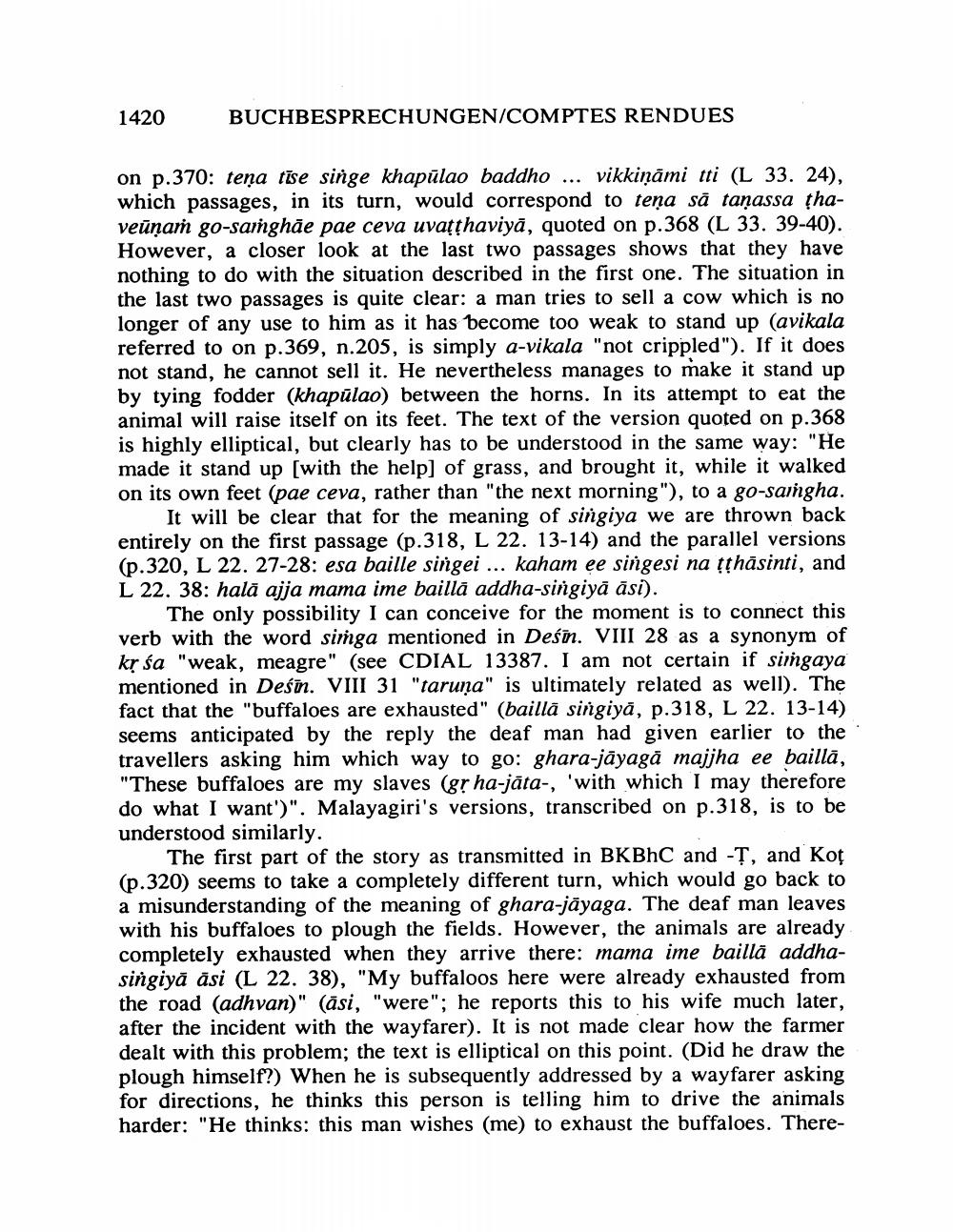Book Title: Buchbesprechungen Comptes Rendues Author(s): Nalini Balbir Publisher: Nalini Balbir View full book textPage 6
________________ 1420 BUCHBESPRECHUNGEN/COMPTES RENDUES The on p.370: teņa tīse singe khapūlao baddho ... vikkiņāmi tti (L 33. 24), which passages, in its turn, would correspond to teņa sa tanassa ţhaveūņaṁ go-sainghāe pae ceva uvațshaviyā, quoted on p.368 (L 33. 39-40). However, a closer look at the last two passages shows that they have nothing to do with the situation described in the first one. The situation in the last two passages is quite clear: a man tries to sell a cow which is no longer of any use to him as it has become too weak to stand up (avikala referred to on p.369, n. 205, is simply a-vikala "not crippled"). If it does not stand, he cannot sell it. He nevertheless manages to make it stand up by tying fodder (khapūlao) between the horns. In its attempt to eat the animal will raise itself on its feet. The text of the version quoted on p.368 is highly elliptical, but clearly has to be understood in the same way: "He made it stand up (with the help] of grass, and brought it, while it walked on its own feet (pae ceva, rather than "the next morning"), to a go-saingha. It will be clear that for the meaning of singiya we are thrown back entirely on the first passage (p.318, L 22. 13-14) and the parallel versions (p.320, L 22. 27-28: esa baille singei ... kaham ee singesi na tthäsinti, and L 22. 38: halā ajja mama ime baillā addha-singiyā āsi). The only possibility I can conceive for the moment is to connect this verb with the word simga mentioned in Deśín. VIII 28 as a synonym of kr śa "weak, meagre" (see CDIAL 13387. I am not certain if simgaya mentioned in Deśin. VIII 31 "taruņa" is ultimately related as well). The fact that the "buffaloes are exhausted" (baillā singiyā, p.318, L 22. 13-14) seems anticipated by the reply the deaf man had given earlier to the travellers asking him which way to go: ghara-jāyagă majjha ee baillā, "These buffaloes are my slaves (gr ha-jāta-, 'with which I may therefore do what I want')". Malayagiri's versions, transcribed on p.318, is to be understood similarly. The first part of the story as transmitted in BKBC and -T, and Kot (p.320) seems to take a completely different turn, which would go back to a misunderstanding of the meaning of ghara-jāyaga. The deaf man leaves with his buffaloes to plough the fields. However, the animals are already completely exhausted when they arrive there: mama ime baillā addhasingiyă åsi (L 22. 38), "My buffaloos here were already exhausted from the road (adhvan)" (äsi, "were"; he reports this to his wife much later, after the incident with the wayfarer). It is not made clear how the farmer dealt with this problem; the text is elliptical on this point. (Did he draw the plough himself?) When he is subsequently addressed by a wayfarer asking for directions, he thinks this person is telling him to drive the animals harder: "He thinks: this man wishes (me) to exhaust the buffaloes. There nself?) When he his person is telling the buffaloes. ThePage Navigation
1 ... 4 5 6 7 8 9 10 11 12 13 14 15
